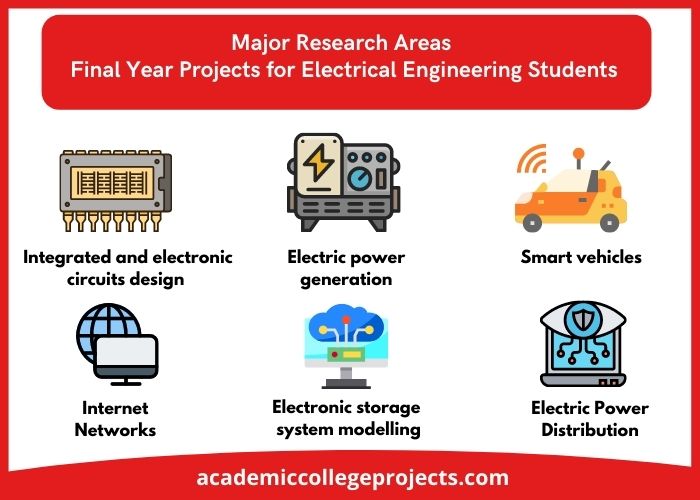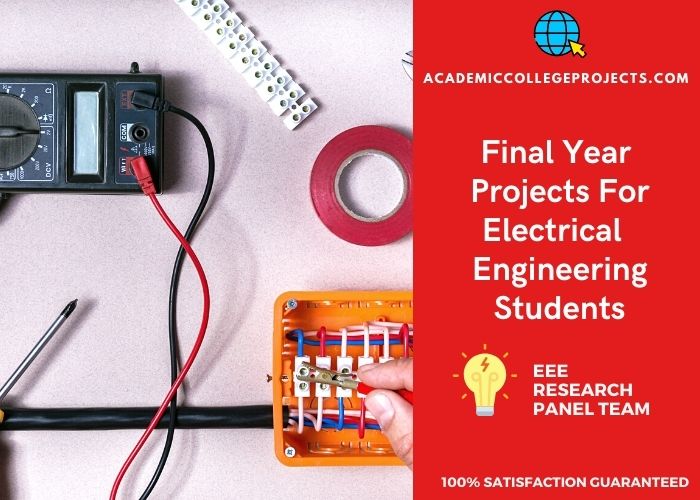Electrical engineering reflects the process of engineering about the electrical systems and controls its functions using optimization or decision-making approaches. One of the significant branches in engineering studies in Electrical and Electronics Engineering (EEE).
Mainly, it is subjected to different study areas such as Signal Processing, Microprocessors, Communication, RF Design, Electrical Machineries, Power Generation, Control systems, etc. Compare to other engineering disciplines, it is an evergreen field among engineers, students, and researchers. Moreover, this field focuses on modelling and developing of wide-range of electronic systems ranging from small-chip to complex systems.
Major Research Areas in Electrical Engineering
- Integrated and electronic circuits design
- Electric power generation and distribution
- Smart vehicles and digital devices
- Internet networks and telecommunication
- Electronic storage system modelling
- And many more
This page is fully intended to deliver current research updates on Final Year Projects for Electrical Engineering Students!!!
Before you get into electrical engineering deep, first of all, one should know the primary types of electrical engineering. In this, we have highlighted the basic materials of physical components used in electrical engineering projects.
Generally, electrical engineering materials are classified into four main types as insulators, conductors, magnetic materials, and semiconductors. Further, there are different materials in each type of electrical engineering.
For instance: semi-conductors are categorized into extrinsic and intrinsic semiconductors. Similarly, magnetic materials are categorized into paramagnetic materials, ferromagnetic materials, antiferromagnetic materials, and diamagnetic materials. Here, we have also given you other important types of electrical engineering material types.
- Electrical Conducting Materials
- Heating Rudiments Materials
- Bimetals
- Brushes Materials over Electric Engine
- Conductor for Electrical Motor Coils
- Fuse Rudiments Materials
- Electrical Contact Materials
- Power Line Materials
- Lamp Filament Materials
- Electrical Carbon Materials
Moreover, electrical engineering is comprised of three different core technologies as fundamental chemistry, mathematics, and engineering. Here, mathematics signifies differential equations, multivariable calculus, and statistics. Likewise, engineering signifies electromagnetism, fluid mechanics, thermodynamics, statics, and dynamics. Further, this field is enriched with two primary electrical classes such as digital electronics and signal analysis. For your information, here we also gave you some special classes i.e. emerging technologies in electrical engineering in the below list.
Emerging Technologies in Electrical Engineering
Below mentioned Research Domain, are most opted in final year projects for electrical students. Reach our electrical expert panel team to know more details,
- Microelectrode Systems
- Bioelectrical Engineering
- Solid-State Electronics
- Computer Engineering
- Audio, Video, Speech Signal Processing
- Optoelectronics
- Communication Systems
Major Research Issues in Electrical Engineering
Currently, the primary research challenge in electrical engineering is electrical noise. As well, it creates random electrical signals to get connected with unnecessary circuits. In this, it disturbs signals that carry information in the form of noise.
In general, noise in electrical signals is referred to as high-frequency interference which is present in between 7000 Hz and 50 MHz spectrum. The power cable that acts as an antenna distributes noise via the power line.
Majorly, the sources of disturbance are radar, cellular, microwave transmission, arc welding, radio, distant lightning, ai based projects etc. Further, noise is also generated through electromagnetic interference sources such as white goods, heaters, motor-operated devices, air conditioners, and other thermostat controllers. For your reference, below we have presented you with various kinds of electrical noise with its sources.
What are the different types of electrical noise?
- Electric Engines Vibration and Acoustic Noise
- Magnetic Sources
- Cause – Magnetic Forces
- Mechanical Sources
- Cause – Bearings
- Aerodynamic Sources
- Cause – Shaft-mounted fans
- Magnetic Sources
- Thermal Agitation Noise (Electrical / Johnson noise)
- Shot Noise
- Cause – Random electron motion
- Transit-time Noise
- Cause – Transition
- Shot Noise
Next, we can see about the electric motor. The main use of this device is to convert electric energy into mechanical energy which is a reversal of electric generators. By the by, it works based on electromagnetism. In specific, it represents a force while electric power exists in a magnetic field. There are different ranges of applications like power tools, hybrid cars, fans, electric vehicles, appliances.
For illustration purposes, here we have taken electric motor systems as an example and addresses two main categories of electric motor systems. Further, we also have different Final Year Projects for Electrical Engineering Students.
Different Types of Electric Motor Systems
- DC (Brushed BDC)
- Wound Field
- Shunt
- Series
- Compound
- Permanent Magnet PM
- Wound Field
- AC (Induction ACIM)
- Single Phase
- Shaded Pole
- Capacitor Start
- Polyphase
- Wound Rotor
- Squirrel Cage
- Single Phase
Our professional engineers and PhD holders are passionate to work on the electrical project and other related projects. In fact, they are capable to design, construct, analyse and control electrical systems. We assure you that we fulfil the need of your proposed electrical engineering project in spite of its complexity. Since we are currently dealing with various electrical requirements in the field of electrical engineering.
To the continuation of electric motor classifications, here we have also given you basic operations involved in electric motor supply and control. Likewise, we also give you keen step-by-step assistance on your handpicked electrical engineering project.
Motor supply
- In case of DC motor, it uses split ring commutator for supplying power
- Further, external commutation and split ring commutators are used to compute AC motors commutation
- By the by, AC motor commutation is in the form of variable-speed and fixed-speed control
- In fact, it also supports both asynchronous and synchronous type which can executes on DC or AC
Motor Control
- On using motor soft starters / grid, AC motors can be functioned at fixed speed
- On modifying DC voltage over terminals, DC motors can be functioned at different speeds through pulse-width modulation (PWM)
- Further, the applications of switched reluctance motor and independently commutated brushless Dc motor are coupled by electronic commutator
- On utilizing variable-frequency drive or power inverter or electronic commutator techniques, AC motors can be functioned at different speeds
In addition, we can see the general workflow of electrical engineering projects. Once you commit your project topic with us, we give an instant development plan for your project. In this, we mention step-by-step implementation procedures, techniques, algorithms, hardware & software requirements, external frameworks (optional), and performance evaluation metrics so that, you can analyze the workflow of the project prior to development.
Particularly, our proposed plan is prepared under the supervision of our field experts. So, we assure you that suggested development technologies and metrics are sure to hit the desired result in your project.
How do we work on electrical engineering projects?
- Process input by analyzing requirements
- Validate the collected requirements
- Perform functional analysis and verification
- Execute synthesis over-designed solution on physical architecture
- Verify and validate proposed design solutions
- Generate output in control system
Our developers have long-lasting experience in handling electrical engineering projects for final-year students and PhD scholars. So, we have the strong groundwork in the technical skills of to implement final year projects for electrical engineering students. In order to make ourselves update on the recent development, we usually enhance our hard and soft skills in the following aspects. This regular practice of knowledge update makes our team stronger in the electrical engineering field.
Further, we are also adept to develop our own hybrid techniques and algorithms to solve complex problems. Therefore, connect with us to tackle any sort of complicated problems in the electrical engineering field.
Our Electrical Engineers Skills
- Create to do new inventions
- Regularly update technical knowledge
- Effective in communication skills
- Capability to complete work within deadlines
- Efficiency in planning and coordinating
- Smart to make you understand complex designs
- Able to take the right decision on uncertain skills
In addition, we have also given you some important project ideas for electrical and electronics engineering field. Beyond this list, we have an infinite number of Final Year Projects for Electrical Engineering Students. As a beginner, you may know only some research areas of electrical engineering. Once you communicate with us, we provide wide-ranging research areas in both current and future research directions of electrical engineering so that, you can choose your topic from the unique and advanced research area of electrical engineering.

List of Project Ideas in Electrical Engineering
- Smart Home based on Bluetooth Control
- Intended to control electrical devices and appliance
- Use android device for installation
- Enable bluetooth module for interfacing with 8051 microcontroller
- Robot for Metal Detection
- Design radio frequency based robotic metal detector
- Detect land mines beneath earth surface for national security purpose
- Circuit Breaker based on Password
- Use 8052 microcontroller for password-based circuit beaker
- Enter password in order to shut down power supply
- Traffic Signal Control based on Density
- Compute traffic density using IR sensors to control road traffic
- Place sensor in every road to sense and monitor traffic on specific road
- Connect all the sensors to microcontroller to manage traffic condition
- Microcontroller for Water Level Monitoring
- Use 8051 microcontroller to detect insufficient water level
- Mainly used in industries to automatically manage liquid level
- Ultra-fast Alert Service for Train Gate Controller
- Implemented for unmanned train gate to prevent accidents in railway crossing
- Microcontroller for Robotic Circuit
- Robot that follow line (i.e., mentioned path) for performing task using microcontroller
- Auto Street Light Control based on Intensity
- Use LEDs and microcontroller to control intensity of street lights
- Electric Robots based on DTMF Control
- Design of cell phone controlled robotics vehicle circuit using DTMF
- Implemented in industrial sector as security system without using microcontroller
- 8051 Microcontroller for Contactless Digital Tachometer
- Use microcontroller for modelling contactless tachometer which is capable to compute speed in 1 rev/sec accuracy
Further, we also support you in selecting development tools and technologies that are apt for your handpicked project topic. In this, we give both development and software installation support. Overall, we are here to provide the best research service with code execution support in final year projects for electrical engineering students.
To the end, we complete your project at your stipulated time without compromising the quality of the project. Moreover, we also extend our service on dissertation writing. We hope that you connect with us to achieve your project ambition through reliable research guidance.


